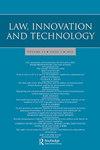Online content platforms, copyright decision-making algorithms and fundamental rights protection in China
Q1 Social Sciences
引用次数: 2
Abstract
ABSTRACT Concentration of power in terms of user traffic and copyright content is most evident in content platforms in China. Such concentration has generated an unexpected impact on the way we understand and appreciate creativity, on copyright enforcement and determination of liability on content platforms, and on the regulation of the cultural market by the government. Specifically, the concentration of power in content platforms has not only curbed direct online piracies to a large extent but has also accelerated the fragmentation of copyright enforcement and spawned the need for algorithmic recommendation and filtering systems, which in turn has reinforced the cultural censorship system of China. This paper argues that the employment of algorithms by platforms must be treated with prudence: the algorithmic decision-making systems employed by platforms must be transparent as much as possible, and remedies must be provided for concerned users. The algorithms employed by content platforms must be adjusted to reflect not just the interests of the platforms but also the public interest in accessing and delivering information and local policy considerations. This paper suggests that our regulatory framework should reflect the algorithmic turn of content platforms in its legal and non-legal instruments and alleviate their negative impact on society.网络内容平台、版权决策算法与中国基本权利保护
摘要用户流量和版权内容的权力集中在中国的内容平台上最为明显。这种集中对我们理解和欣赏创意的方式、内容平台的版权执法和责任认定以及政府对文化市场的监管产生了意想不到的影响。具体而言,内容平台的权力集中不仅在很大程度上遏制了直接的网络盗版,而且加速了版权执法的碎片化,并催生了对算法推荐和过滤系统的需求,这反过来又加强了中国的文化审查制度。本文认为,平台使用算法必须谨慎对待:平台使用的算法决策系统必须尽可能透明,并为相关用户提供补救措施。内容平台使用的算法必须进行调整,以不仅反映平台的利益,还反映公众在访问和传递信息方面的利益以及当地政策考虑。本文建议,我们的监管框架应在其法律和非法律文书中反映内容平台的算法转向,并减轻其对社会的负面影响。
本文章由计算机程序翻译,如有差异,请以英文原文为准。
求助全文
约1分钟内获得全文
求助全文
来源期刊

Law, Innovation and Technology
Social Sciences-Law
CiteScore
4.50
自引率
0.00%
发文量
18
期刊介绍:
Stem cell research, cloning, GMOs ... How do regulations affect such emerging technologies? What impact do new technologies have on law? And can we rely on technology itself as a regulatory tool? The meeting of law and technology is rapidly becoming an increasingly significant (and controversial) topic. Law, Innovation and Technology is, however, the only journal to engage fully with it, setting an innovative and distinctive agenda for lawyers, ethicists and policy makers. Spanning ICTs, biotechnologies, nanotechnologies, neurotechnologies, robotics and AI, it offers a unique forum for the highest level of reflection on this essential area.
 求助内容:
求助内容: 应助结果提醒方式:
应助结果提醒方式:


